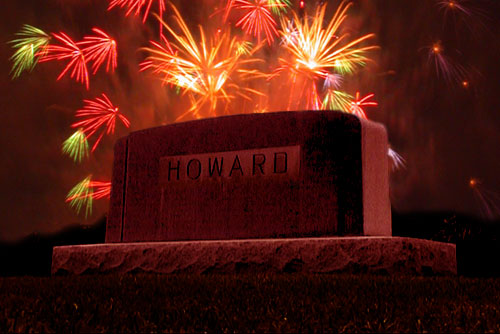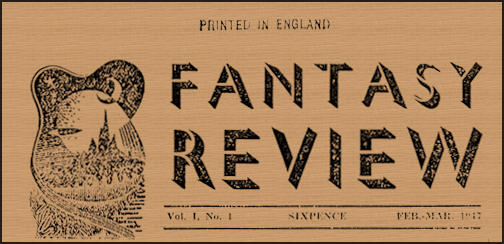A Howardian Fourth
Wednesday, July 4, 2007
posted by Leo Grin
 Print This Post
Print This Post

Happy Fourth of July to all of the loyal Cimmerian readers out there. Here’s hoping there’s a lot of parades and BBQs for you to indulge in, along with perhaps a visit to a military gravesite or cemetery. I’ll be checking in on and paying my respects to Admiral John Ford, my all-time favorite movie director (whose current residence, the magnificent Holy Cross Cemetery, is just down the street from where I live), before hoofing it over to the home of another veteran of World War II, Rah Hoffman, for some patriotic food and fun with him and Donald Sidney-Fryer.
To satisfy your Howard craving for the day, you can read my Fourth of July post from last year to learn about what Howard thought of this particular holiday. And in case that’s too much of a downer, I’m including a brighter note below, specifically a perceptive blast from the past in the form of a review of Howard’s first hardcover collection in the States, 1946’s Skull-Face and Others.
With John Haefele’s wonderful essay on this same book (from TC V3n9) snagging a Hyrkanian Award at this year’s Cimmerian Awards, it’s a good time to look back on a commentary about REH written way back before there was the large amount of criticism, correspondence, and other material available to sway readers. The reviewer in question, British fan Arthur Hillman, had to rely simply on what had appeared in Weird Tales and elsewhere during those years, and he proves himself more than up to the task, making more profound points about our favorite Texan in a few short paragraphs than most others do in a lifetime.

This review appeared in the premier issue of Fantasy Review, a British semi-pro fan magazine that began publication soon after World War II had ended, when after a lengthy drought British fans were finally able to reconnect with their American counterparts. Listen:
Book Reviews
A Howard Anthology
SKULL FACE AND OTHERS, by Robert E. Howard
Arkham House, Sauk City. $5.00
Reviewed by Arthur F. HillmanAmong the many stories contained in this long-awaited and much-heralded volume are some of the gems from the brilliant crown of the late Robert Ervin Howard, who needs no introduction to readers of weird fantasy. Such tales as “The Scarlet Citadel,” “Worms of the Earth,” and “The Shadow Kingdom” have the inspirational spark that breathed life and fire into the puppets and panoramas of the gifted Texan. In these, and others, his splendid vigour of expression are self-evident.
The addition to this collection of powerful stories of the “The Hyborian Age” (the imaginary historical framework around which many of his tales were set), and of “A Man-eating Jeopard,” that delightful character study of his own locale and upbringing, was also a happy choice. But what strikes a true Howard follower with something of a jarring note is the scarcity of “Conan” tales; those swashbuckling exploits of the Cimmerian adventurer whose savage resource and ruthless energy are a secret delight to our atavistic instincts.
Out of the 14 stories which appeared originally in Weird Tales, only five have been selected for this anthology by the productive Mr. Derleth. But he, probably conscious of the number of admirers of Conan the Barbarian, seems to have prepared his defence in advance of this criticism. His argument is that too many of Conan’s exploits, taken together, would sicken the reader with the total butchery and carnage involved.
To me this is sheer sophistry; the same excuse for a similar neglect might be applied equally to some of his other excellent volumes. One might as well say that too many of Lovecraft’s tales, taken together, would make his horrors small beer; that too much of Clark Ashton Smith’s exotic outpourings would bring on literary indigestion. But one does not drink a whole bottle of brandy without pause, and fantasy of a particular type should never be read in large quantities at one sitting. Such tales, delicate pieces of craftsmanship as they are, should be sampled sparingly, at a time and place specially suitable. This is only right and proper, as a reciprocal arrangement with the author who has lavished such care and attention on his work for your benefit.
Thus, with true discrimination, a reader could enjoy a whole bookful of Conan tales; and the present volume must be considered woefully inadequate in this respect. The two long stories, “Red Nails” and “The People of the Black Circle,” which are among the finest in the series, are both missing; instead we have “Skull Face,” which is very Sax Rhomerish and inferior to these two. For Howard’s imagination was soaring on stronger pinions as the years passed, and his earlier tales do not, in my opinion, compare with the promising epics he produced before his untimely death cut short his career.
Nonetheless, all true followers of Howard should get this book. But they should also insist that Mr. Derleth make expiation for his sins of omission and produce a second volume of stories of this natural-born writer, whose untamed genius puts to shame many of the stars in the literary firmament of today.
Don’t know about you, but I think that’s a stellar review, comparable with the short, somewhat contemporary piece written by Paul Spencer (and reprinted in our modern era in The Barbaric Triumph). And note that even in 1947 people were calling Howard’s most famous character Conan the Barbarian, not the “Conan the Cimmerian” championed by purists in our era. It seems that Hillman needed neither the comics of the 1970s nor the Gnome Press hardcover of the 1950s to prompt him to use that particular phrase.
I found the editorial of the first issue of Fantasy Review interesting for what it tells us about being a fan in those years, specifically how difficult it was to know what was even available. The editor was Walter Gillings, who was a central force in British fandom from the early ’30s until his death from heart attack in July, 1979. Gillings had a rough time in the war, as he was a conscientious objector and was fired from his job over his pacifist stance. But during those early years he founded Britain’s first fan group and edited a slew of important publications, and by the early ’50s more than a few people considered Fantasy Review “the most outstanding fanmag of all time.” Fantasy Review ran from 1947-1950, eighteen issues in total. But Gillings’ editorial in the first one is what struck me all these years later, filled as it is with talk of the War and the difficulties levied on fans of science fiction and the fantastic.
REVIVAL
If your experience of science-fantasy goes back to the days when a magazine devoted to it was a rare discovery, you will probably remember Scientification — The British Fantasy Review. That there were in these islands at that time enough fantasy readers to justify a journal catering for their interests was a significant factor in the developments which followed. It was not long before the first British science fiction magazine, Tales of Wonder, appeared. Hard on its heels came Fantasy; and had it not been for the war, which separated most British readers from the American magazines as well, there is little doubt that the medium would by now have established itself firmly in the field of popular literature.
But the war did not stop the continued evolution of fantasy fiction in America, whence to a fortunate few have come evidences of a change for the better in the method of its presentation — not so much in magazines as in the more permanent form of books. This elevation of fantasy to a more distinguished sphere has brought an intense activity in the reading and collecting of volumes of both science and weird fiction, a trend which has had repercussions among well-informed readers on this side of the Atlantic.
With the return to peace and the effects of war-time influences on reading tastes, there is ample indication of a desire on the part of publishers on both sides to meet the increasing demand for fantasy. New magazines; new books; new publishing concerns specialising in the medium. The fantasy fan has no cause for complaint, now — except, perhaps, that there is nothing to keep him up to date with all the information he needs to pursue his fascinating hobby.
Hence FANTASY REVIEW. which has been revived under its new title to cover the entire field of fantasy fiction and its allied interests, to reflect its growing popularity here and abroad, and to serve the discriminating reader and collector. To fulfil this function, we have recruited experts in every branch of the medium to serve its readers, and we shall keep its columns open to all who wish to express their views on any aspect of the literature in which they delight. It is the journal of the fantasy reader — produced by fantasy readers. As such it should make a valuable contribution to the further development of the medium; and as a source of reliable information and guidance, it should be indispensable to all who are interested in any of its ramifications.
THE EDITOR.
Too often we fail to comprehend the long and honorable legacy of the legions of fans who have come before us, and seldom to we stop to appreciate all of the hard work they put into popularizing the authors we revere, keeping their names and work in play through decades of neglect, until finally the stars aligned and a resurgence occurred. So on this day of remembrance and celebration, take a moment to offer silent thanks to the memories of men like Gillings and Hillman. If they hadn’t carried the torch through the greatest and most savage war the world had ever known, Howard and his fans would be much poorer for it.
AND ONE LAST LINK: Friend of The Cimmerian John J. Miller posted an amusing link over at The National Review that will elicit a chuckle from Cimmerian readers for sure. (for an encore, John should screen the hysterical Late Bloomer during the next NR cruise). And for those of you who are fans of Robert Heinlein, John’s got a great piece on the author’s centenary in the latest print edition of TNR, along with some thoughts on conservative sci-fi in general.
Steve adds: For this somewhat impure purist, Hillman’s use of “Conan the Barbarian” was rendered more palatable by his preceding reference to “the Cimmerian adventurer.” I like the notion of Howard’s later imagination “soaring on stronger pinions,” and it certainly behooves someone named Hillman to complain about the Derlethian snubbing of “The People of the Black Circle.” He might be unduly confident that no one drinks “a whole bottle of brandy without pause,” though.
A shame that Fantasy Review shut down in 1950; had they been able to stick it out until 1954 and 1955, they would have been well situated to comment on the single most gobsmacking postwar instance of the “elevation of fantasy to a more distinguished sphere.”
